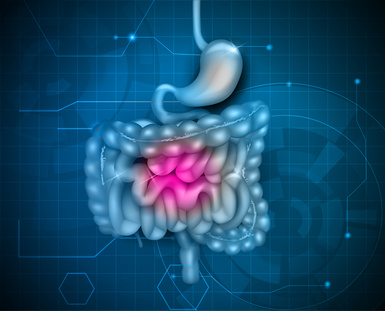Bio-Resonance Therapy for Digestive Disorders
Intestinal function plays a large part in the allergic process. First of all, digestive function: from the oral cavity via the stomach to the small intestines the breaking up, selection and absorption of food stuffs represents the most important task.

The digestive system: stomach, large intestine & small intestine
How do lactose intolerance and food allergies develop?
Allergy sufferers often display reduced activity of the natural digestive enzymes as they may not have enough digestive enzymes present. This may include a deficiency of proteolytic enzymes, which are responsible for helping to break down proteins. For example, those who experience digestive symptoms when they consume dairy products may have low levels of the enzyme lactase that is needed to digest the protein lactose.
Those with allergies also may have impaired intestinal mucosal barrier function as well as malfunction of the gut-associated immune system. This is similar to how celiac disease causes the immune system to overreact in the presence of gluten, leading to an inflammatory response.
An insufficient amount of enzymes mean that large molecules are often not broken down completely. A compromised barrier then makes it more likely that these molecules will then penetrate through the porous intestinal mucous membrane to the lymphatic tissue. This can then cause an intensified immune response to occur. According to an established theory, this process is the main cause of the development of food allergies and intolerance. This dysfunction is accompanied by disturbed intestinal flora, i.e. an imperfect mix of micro-organisms in the gut.
How may the diet be causing symptoms?
This immune reaction to undigested molecules explains why an unhealthy diet consisting of a lot of sugar, white flour and artificial substances such as colourings and preservatives plays a large part in the development of allergies. Digestive function is disrupted and the immune system weakened by the swapping of the healthy physiological intestinal flora by species of pathogenic bacteria and fungi.
Unbalanced gut bacteria
An increase in the number of pathological bacteria and yeast fungi, especially Candida albicans, produces fusel alcohols and other toxins. The patient is often aware of this in the form of increased accumulation of gas with flatulence, intestinal cramps and irregular bowel movements. What they are not aware of is that the toxins disrupt the immune cells and negatively affect the liver. These substances can also impair many other bodily functions by travelling through the blood vessels and lymph systems.
Serious health conditions of the digestive tract
Careful analysis using conventional medical methods such as laboratory tests, ultrasound and possibly a colonoscopy is essential prior to any naturopathic treatments being conducted. While stomach pain, bloating, bowel problems and other similar symptoms are involved in common digestive disorders, they could also be an indication of a dangerous underlying health problem. It would be a serious failure by therapists to spend considerable time treating what was thought to be a food allergy and possibly overlooking more serious conditions such as colon cancer or cancer of the other digestive organs.
Patients should be encouraged to consult a series of conventional medical specialists. This is especially true when their digestive symptoms are severe. It also may be slightly more likely that a person’s abdominal pain is caused by a more serious health condition if they have a family medical history of cancer of the small intestine or large intestine.
Supporting the digestive system with bioresonance
Disrupted gut bacteria, fungal infestations and food intolerances are some of the main causes of many chronic disorders of the gastrointestinal tract (gi tract). In many cases, even chronic inflammatory processes such as those found in Crohn’s disease and ulcerative colitis can be treated with targeted Bioresonance diagnosis and therapy.
A complementary therapy
Rather than just being used as an isolated treatment, bioresonance therapy can be safely used in conjunction with appropriate lifestyle changes. These may include ensuring that the diet contains enough different nutrients and consuming probiotic foods such as fermented cabbage. These substances support the digestive system by boosting populations of healthy gut bacteria and they also have anti inflammatory properties.
Prebiotic foods provide fuel for the existing gut flora and are broken down by the body into fatty acids. They can provide a source of dietary fiber that is beneficial for the digestive tract. It may also be beneficial for the gut health to swap processed sugary foods for foods that contain small quantities of natural sugar.
There are many real-life experiences of successful bioresonance treatments as found in the book Bioresonance: a new view of medicine.

